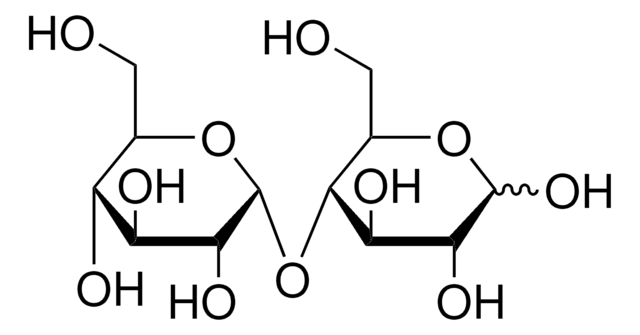M5885
D-(+)-Maltose monohydrate
from potato, ≥99% (HPLC)
Synonym(s):
4-O-α-D-Glucopyranosyl-D-glucose, Maltobiose
About This Item
Recommended Products
biological source
potato
Quality Level
Assay
≥99% (HPLC)
form
powder
technique(s)
HPLC: suitable
impurities
≤0.3% Glucose
≤1.0% maltotriose
color
white
useful pH range
5.0-7 (25 °C, 180 g/L)
mp
125.13 °C (1013.25 hPa)
solubility
180 g/L at 20 °C
application(s)
agriculture
storage temp.
room temp
SMILES string
O.OC[C@@H](O)[C@@H](O[C@H]1O[C@H](CO)[C@@H](O)[C@H](O)[C@H]1O)[C@H](O)[C@@H](O)C=O
InChI
1S/C12H22O11.H2O/c13-1-4(16)7(18)11(5(17)2-14)23-12-10(21)9(20)8(19)6(3-15)22-12;/h1,4-12,14-21H,2-3H2;1H2/t4-,5+,6+,7+,8+,9-,10+,11+,12+;/m0./s1
InChI key
HBDJFVFTHLOSDW-DNDLZOGFSA-N
Looking for similar products? Visit Product Comparison Guide
Application
- Fecal microbial and metabolic characteristics of swine from birth to market.: This research analyzes the microbial and metabolic profiles of swine at various life stages. ᴅ-(+)-Maltose is utilized in the culture media to study microbial growth, providing insights into the gut microbiota of livestock and its implications for animal health and productivity (He et al., 2023).
- Quantification of disaccharides in solution using isomer-selective ultraviolet photodissociation of hydrogen-bonded clusters in the gas phase.: This study presents a novel method for quantifying disaccharides, including ᴅ-(+)-Maltose, using ultraviolet photodissociation. The method provides precise measurements of disaccharide concentrations, beneficial for chemists involved in analytical biochemistry (Nagai et al., 2023).
Biochem/physiol Actions
Other Notes
Storage Class Code
11 - Combustible Solids
WGK
WGK 1
Flash Point(F)
Not applicable
Flash Point(C)
Not applicable
Personal Protective Equipment
Choose from one of the most recent versions:
Already Own This Product?
Find documentation for the products that you have recently purchased in the Document Library.
Protocols
Enzymatic Assay of β-AMYLASE (EC 3.2.1.2)
Enzymatic Assay of α-Glucosidase by the Modified Boehenger Procedure (EC 3.2.1.20)
Our team of scientists has experience in all areas of research including Life Science, Material Science, Chemical Synthesis, Chromatography, Analytical and many others.
Contact Technical Service


